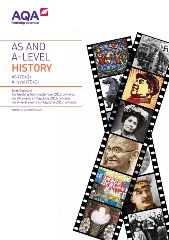2G The Birth of the USA, 1760–1801
This option provides for the study in depth of the years in which thirteen American colonies chose to sever their links with Great Britain and thus found the USA. This study explores the concepts of imperialism, mercantilism and legitimate government and encourages students to reflect upon the interplay of forces from below and above, the importance of ideology and the economy in political development and the issues facing those who attempt to challenge an established authority.
Part one: the origins of the American Revolution, 1760–1776
Britain and the American Colonies, 1760–1763
- Britain and North America in 1760: British attitudes towards the colonies; the politics of Empire; rivalries with France
- The Thirteen Colonies: social, economic and political characteristics; divisions and rivalries within the colonies
- The price of victory: the impact on relations between Britain and the colonists of the successful outcome of the French and Indian War and the Seven Years War
- The dream of westward expansion: the expectations of the colonists; exploiting the territories acquired from French Canada
Enforcing the Colonial Relationship, 1763–1774
- British government legislation and policies towards the colonies; including the Proclamation of 1763; the Stamp Act and the Townshend Acts
- The reaction of the colonists: the attitude of the colonial elites
- The reaction of the colonists: pressure and reform movements from below
- Escalating tensions: the Boston Tea Party; the ‘intolerable’ Five Acts; the organisation of colonial opposition in Massachusetts
Ending the Colonial Relationship, 1774–1776
- The hardening of colonial opposition: the First Continental Congress; the creation of new state constitutions
- The ideology of revolution: Paine’s Common Sense; the influence of ideas on colonial leaders such as Samuel Adams and Thomas Jefferson; divisions between loyalists and rebels
- The escalation of conflict: British actions to maintain control including the Quebec Act and the assertion of military control under General Gage; colonial militias and the outbreak of hostilities in 1775
- The Declaration of Independence: its political origins and its impact on the revolutionary cause
Part two: establishing the Nation, 1776–1801 (A-level only)
The War of Independence, 1776–1783 (A-level only)
- The balance of military power in 1776: the strengths and weaknesses of Britain’s military position, the strengths and limitations of the revolutionary forces, geographical factors
- The international context: the part played by France, diplomacy and sea power; the part played by Spain
- The conduct of the war: American political leadership, the revolutionary armies and George Washington as military leader; the political and military failures of Britain’s war effort
- Recognition of the new nation: the conduct of the peace negotiations, the terms of the peace settlement 1783
Founding the Republic, 1776–1789 (A-level only)
- The Articles of Confederation: drafting from 1776; ratification by the thirteen states
- Obstacles blocking the path to a republic: economic problems, social tensions and inter-state disputes, the issue of slavery
- Making the Constitution: the Philadelphia Convention and the constitutional debates between federalists and anti-federalists, the personalities and policies of the ‘Founding Fathers’
- Ratification of the new Republic: the forwarding of the constitution to the states by the Continental Congress, ratification of the constitution by state conventions
Washington and Adams, 1789–1801 (A-level only)
- The powers of the presidency: Washington and Adams as presidents, the implementation of the constitution
- Financing the new nation: Alexander Hamilton as Secretary of Finance, the balance between federal and state authority
- The rise and influence of political parties: the Jefferson Republican (Democratic Republican Party) under Jefferson and James Madison, the Federalist Party under Alexander Hamilton and John Adams
- The United States in 1801: the extent of national unity, relations with the world outside.
